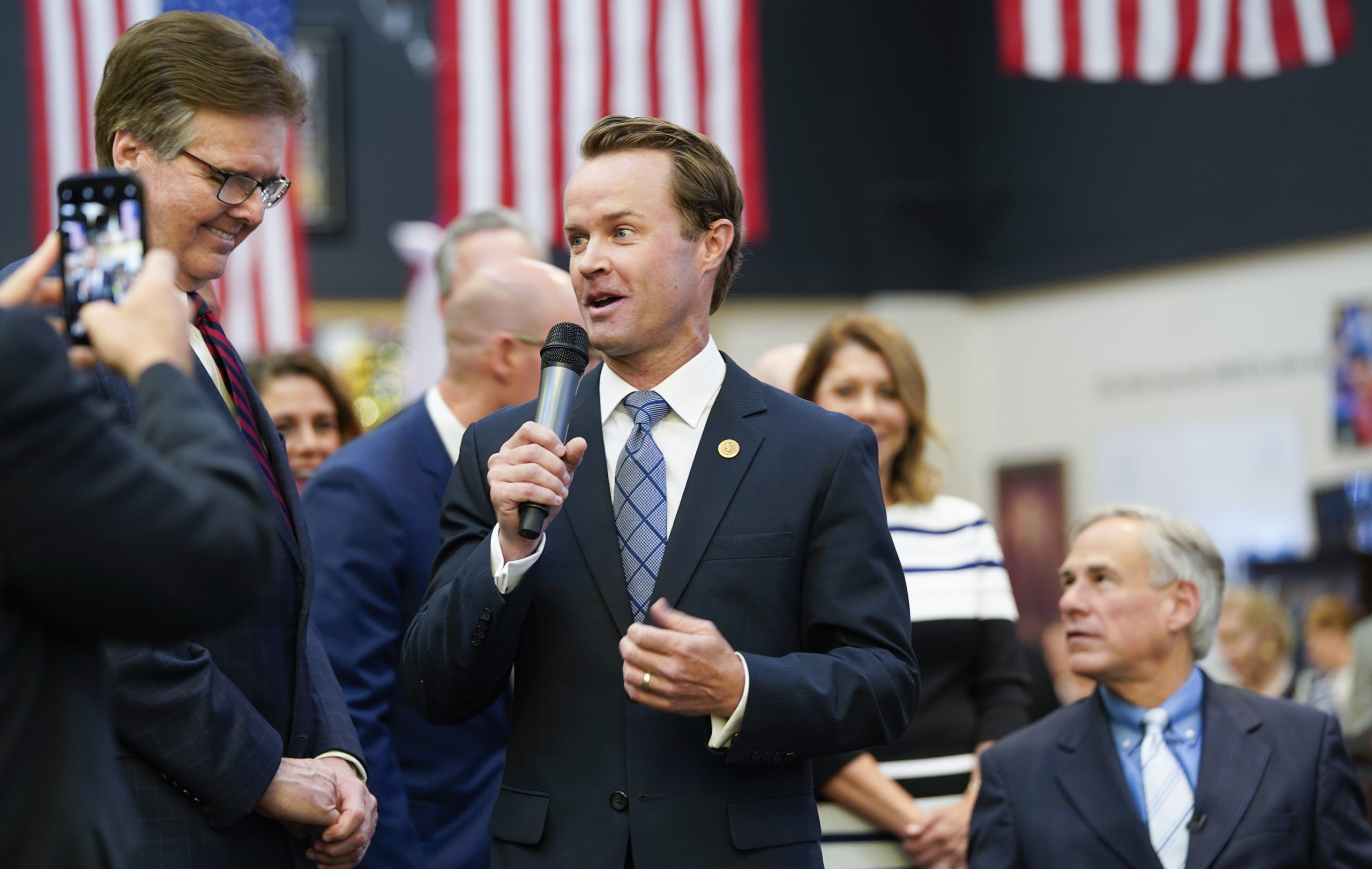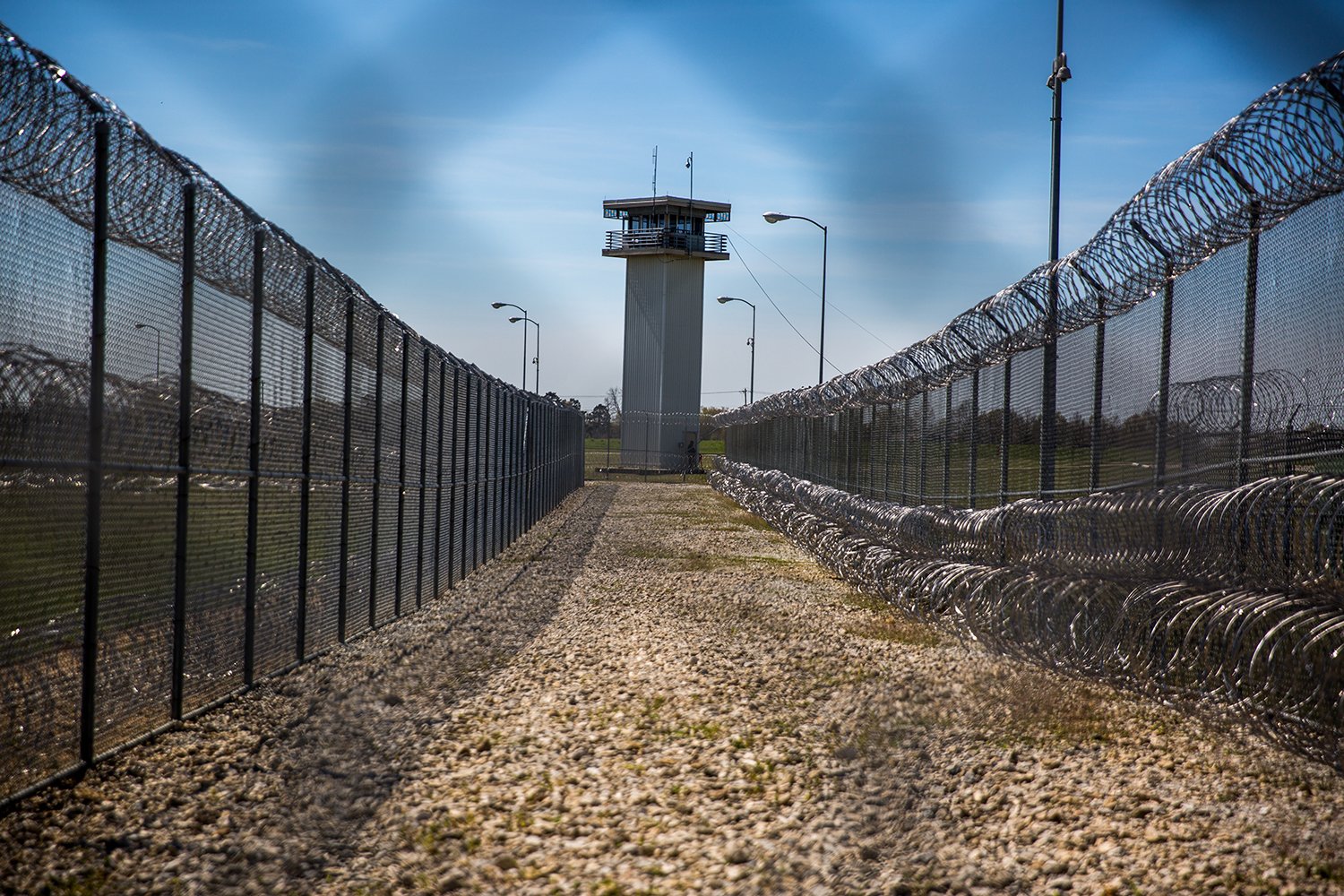An uncontrolled pandemic. An economic crisis. A bruising loss for Democrats. The Texas Legislature is back in session.

By Justin Miller
January 11, 2021
By the time Texas lawmakers meet for the first time since the pandemic started, more than 29,000 of their constituents will have died of COVID-19. Nearly 2 million will have been infected. Roughly 4 million will have filed unemployment claims, at times nearly crashing the state’s outdated and unprepared system. Hundreds of thousands will have lost their health insurance. Thousands of businesses will have shuttered.
For the past 10 months, Governor Greg Abbott has used his vast emergency powers to almost single-handedly lead Texas’ response to the COVID-19 pandemic as it has wreaked havoc across the state. The Legislature, which meets every two years, is one of just three in the country that has not convened since March. While other states have held special sessions to deal with the public health emergency and economic crisis, Abbott resisted calls to do the same in Texas.
Now, as state lawmakers head back to work in January, the challenges they face are immense. The pandemic has thrown Texas’ finances into chaos. On January 11, State Comptroller Glenn Hegar announced a nearly $1 billion revenue shortfall for the current biennium that lawmakers will have to fill, and projected the budget for the next two years will be only slightly lower than the current one. The estimates weren’t as catastrophic as many feared, but with the coronavirus raging and many Texans still trying to stay afloat in the middle of an unprecedented economic emergency, Hegar warned that his forecast “remains clouded with uncertainty.”
The pandemic-induced financial crisis has set the stage for a legislative session that will be akin to a medical triage unit. Questions of who and what gets treated are already fueling political tensions within the Capitol. On the Republican side, talk of budget cuts began immediately. But years of spending cuts and underfunding of services—like the public health system—have made the state more vulnerable to the pandemic, and Democrats say now is the time for bold investment—from expanding Medicaid to providing economic relief for workers and businesses—instead of a rush to austerity.
Back in May, Abbott, Lieutenant Governor Dan Patrick, and then-House Speaker Dennis Bonnen ordered most state agencies and higher education institutions to submit budget plans that would cut spending by 5 percent. They exempted the Department of State Health Services, the Department of Public Safety, and the Texas Workforce Commission, along with appropriations for certain critical services. But they warned agency leaders that “it may become necessary to make additional budget adjustments” when the state’s revenue projections became clearer.
Senate Finance Committee chair Jane Nelson took this a step further. “As I meet with each agency to review their appropriation requests, I will begin at ZERO,” the North Texas Republican wrote in a letter in May. This would mark a drastic departure from the norm, where the previous budget cycle’s funding levels serve as the baseline. Nelson said that her proposed budget “will adhere to both constitutional spending limits, as well as my depression-era parents’ philosophy of ‘If you don’t have it, you shouldn’t spend it.’”
Lawmakers from both parties have voiced support for tapping the state’s Rainy Day Fund, which is expected to total around $8.5 billion by the start of session. But beyond plugging the state’s budget deficit, it’s not clear how much political appetite there is to reach deeper into the piggy bank to pay for further support. Abbott has long been stingy with the fund; lawmakers didn’t approve dipping into the Rainy Day Fund for Hurricane Harvey relief until 2019, two years after the storm hit. Abbott also drew criticism this fall from legislators like state Representative Donna Howard, an Austin Democrat, for leaving nearly half of the state’s $12 billion from the federal Coronavirus Aid, Relief, and Economic Security (CARES) Act on the table for months. Abbott didn’t announce his plans for the rest of this money until a month before the December 30 deadline for it to be spent.
“The fact is, we have a very lean budget already,” says Howard, who serves on the House Appropriations Committee. “I’m concerned about some of my colleagues and their rhetoric about tightening our belts when there are really not any more notches on that belt. From education and health care spending to workforce training and broadband connectivity, it’s penny-wise and pound-foolish to cut back on those very things that are gonna help us get back to work.”
State lawmakers last convened under much rosier circumstances. In early 2019, Hegar released estimates that projected an 8 percent increase in general revenue for the upcoming two years and a Rainy Day Fund that was set to reach an all-time high of $15.4 billion.
That legislative session was about as close to sunshine and rainbows as you’ll find in Texas politics. After Democrats made significant gains in the 2018 election—flipping 12 state House seats and two Senate seats—Republican leaders largely put red-meat partisan issues on the back burner to pass significant school finance and property tax reform bills. These bread-and-butter issues were the cornerstone of what has been dubbed a “kumbaya” session in which the House and Senate, Democrats and Republicans, liberals, moderates, and conservatives alike, had—with some exceptions—worked in accord. It was a stark departure from the more acrimonious sessions of the recent past.
At a triumphant press conference just days before the 2019 session concluded, Abbott, Patrick, and Bonnen announced a $11.6 billion deal on school finance and property taxes. “We’re more together than we’ve ever been,” Bonnen said.
Now, lawmakers and advocates say they’re preparing for a very different kind of session.
Heading into the 2020 election, democrats were confident about their chances of taking control of the Texas House—and a lever of power in state government—for the first time in nearly two decades. So much so that four Democrats announced their candidacy for speaker of the House before all the ballots were cast. El Paso state Representative Joe Moody was last, announcing he’d run on the morning of Election Day, and predicting, “Before the day is done, Democrats will take the Texas House.”
The party came up woefully short, despite unprecedented levels of financial support from Democratic groups and record-breaking voter turnout. Needing to flip nine seats, Democrats failed to net even one. Liberals have long said that Texas isn’t a red state, it’s a nonvoting state. That changed in 2020, as more than 66 percent of the state’s 17 million registered voters turned out to the polls, a rate nearly 7 points higher than in 2016. But the surge was not as favorable for Democrats as they’d expected. Joe Biden received the most votes for a Democrat on the ballot in Texas ever, winning about 1.4 million more votes than Hillary Clinton in 2016 and besting her margin against Donald Trump by 3 points. But Republican turnout surged as well. While his statewide margin slipped, Trump still rallied 1.2 million more voters to the polls than he had four years earlier.
Meanwhile, Democrats faltered down-ballot. “Expectations were raised and we didn’t meet them,” said Chris Turner, chair of the Texas House Democratic Caucus, in November. “We’ve got to figure out what went wrong. No question.”
Abbott’s political strategist Dave Carney put it more bluntly, saying of Democrats: “Well, I think we fuckin’ blew that bullshit up yesterday when over 11 million people voted and they still lost and they lost everywhere.”
Smarting from their dashed hopes and political setback, Democrats head back to the Capitol in the same position they’ve been in since 2003: the minority. “It is not unfamiliar territory for any of us,” says Moody, who was first elected in 2008, when Democrats fell just two seats shy of taking back the House. “Where we landed is a place where we know how to work.”
On November 4, the morning after Election Day, state Representative Dade Phelan announced that he had enough support from members, including Democrats like Moody, to lock up the speakership. The Beaumont Republican was a top lieutenant of Bonnen’s, who had been elected speaker by a similar coalition just two years earlier. Bonnen retired from office after he became engulfed in a political scandal last year stemming from a secretly recorded meeting in which he tried to strike a deal with a far-right activist to run primary challengers against GOP colleagues who didn’t toe the party line.
Phelan, who chaired the powerful House State Affairs Committee last session, has been lauded by both Republicans and Democrats as a straightforward leader who, like Bonnen, will largely let the members determine the agenda of the House. He’s held his cards close to his chest since announcing his claim on the speakership, and his office did not respond to an interview request. But there are clues as to what sort of speaker he may be.
The presumptive speaker has been a key player in the GOP’s war on local control led by Governor Abbott. Over the course of the pandemic, Abbott has repeatedly stripped county judges and mayors of their ability to slow the spread of the virus through mask mandates and stay-at-home orders. His local control crusade is likely to continue during the session, with bills already filed to formally limit the emergency powers of county judges and mayors, prohibit cities from cutting their police budgets, and ban taxpayer-funded lobbyists. In December, Abbott said he wants the state to take control of policing in downtown Austin.
Phelan was at the center of anti-local control fights in 2019—a legislative session Bonnen boasted of telling local officials he aimed to make “the worst session in the history of the Legislature for cities and counties.” Phelan was mentioned in the recorded meeting as Bonnen and fellow Republican state Representative Dustin Burrows reminisced about scheduling simultaneous hearings on major bills that would cap local property tax revenues and ban cities and counties from hiring lobbyists, to prevent local leaders from attending both. Burrows recalled Phelan asking, “Hey, how much fun do you think it will be to have [Austin] Mayor [Steve] Adler run back and forth between trying to cover these two things?”
Phelan had sponsored the bill to prohibit local governments from hiring lobbyists, likely to be a top conservative priority again this session after it failed in the House in 2019. He also carried legislation last session that would have prohibited municipalities from enacting their own local labor provisions, like the paid sick leave policies passed by Austin, Dallas, and San Antonio. But he curried favor with Democrats when he took a stand against Patrick’s amended Senate version of the bill that would have banned local nondiscrimination ordinances protecting LGBTQ employees—a move that ultimately killed the bill. “I’m kind of done talking about bashing on the gay community,” he told the Texas Tribune at the time.
“Well, I think we fuckin’ blew that bullshit up yesterday when over 11 million people voted and [Democrats] still lost and they lost everywhere.”
Meanwhile, the state’s budget crunch has fueled uncertainty, as advocates wonder whether their policy priorities will end up on the cutting room floor. That includes the increase in public education funding that was the hallmark of the 2019 session. Encouraged by the state’s then-rosy revenue estimate, lawmakers passed House Bill 3, their $11.6 billion school finance and property tax reform package, without a way to pay for it beyond 2021. “It was shortsighted to not have a revenue source to go along with HB 3 to begin with,” says Chandra Villanueva, a school finance expert at the Austin-based think tank Every Texan.
But advocates hope the pandemic, combined with the revenue crunch, could lead to an unlikely bipartisan agreement. Before the pandemic hit, Democrats saw a takeover of the Texas House as key for advancing the prospects of Medicaid expansion in the state. But as COVID-19 has ravaged the state economy and thrown even more Texans into the ranks of the uninsured, Democrats are guardedly optimistic this could persuade enough Republicans to put aside their political hangups and support expansion—even as Republican Attorney General Ken Paxton leads a national lawsuit to eliminate the entire Affordable Care Act.
Texas is one of 12 remaining states that have refused the federally subsidized Medicaid expansion, despite having the highest rate and largest population of uninsured residents in the country. Expanding Medicaid would cover 1 million uninsured Texans and bring in as much as $5.4 billion to the state, according to a September report by researchers at Texas A&M University.
State Representative Lyle Larson, a moderate Republican, voiced his support for expanding Medicaid soon after the election, pointing to six GOP-led states that have done so in the past three years. “It is a business decision,” Larson wrote on Twitter, noting that the move would help with the revenue shortfall and COVID-19 response, address rural hospital closures, and expand access to care. Dallas County Representatives Morgan Meyer and Angie Chen Button, both Republicans, pulled out razor-thin victories to keep their House seats after voicing support for some type of Medicaid expansion in their campaigns.
Even conservative state Senator Paul Bettencourt acknowledged that the fiscal crunch will force consideration of Medicaid expansion. “My back-of-the-napkin analysis shows that’s a $1.6 billion item, like that—boom!” he told the Dallas Morning News in September. “I’m pretty sure we don’t have that falling out of trees,” he said. “You can put Medicaid expansion up at the top of the list. There will be a debate.”
But there’s still plenty of staunch opposition. “For those that promote [expansion], I haven’t heard what they’re willing to cut,” state Senator Kelly Hancock, a Republican who chairs the Business and Commerce Committee, said in November. “It’s easy to talk about it until you have to pay for it, especially going into this budget cycle.”
The economic crisis has also given hope for other long-shot policies that could raise money for the state. Last session, Representative Moody’s bill to decriminalize marijuana passed out of the House with a supermajority, only to die in the Senate. This time, he’s aiming higher with legislation that would fully legalize weed. Representative Terry Canales, also a Democrat, authored a bill that would put the matter to voters through a ballot referendum. Marijuana legalization still faces long odds—particularly in Dan Patrick’s Senate—but the fiscal upsides could be more alluring this session. If taxed, as it is in Colorado, legal weed could generate more than $1 billion per biennium in Texas, according to a recent estimate.
Another political long shot—legalizing casinos and other gambling—might also gain traction amid a scramble for new revenue. While social conservatives have long opposed legalized gambling in Texas, proponents have more political muscle this time. After Sheldon Adelson and his wife pumped more than $4 million into a Republican PAC that aided state House GOP incumbents, the casino magnate may be trying to cash in. In the weeks after the election, his company, Las Vegas Sands Corporation, hired a small army of high-powered lobbyists, including Gavin Massingill, the former chief of staff to Speaker Bonnen; former top aides to Governor Abbott; and lobbyist Karen Rove, wife of Karl. The most notable hire was Mike Toomey, a conservative super-lobbyist who formerly served as Governor Rick Perry’s chief of staff. Toomey’s most recent role? Running Abbott’s donor-stacked Strike Force to Open Texas, tasked with advising the governor on reopening businesses during the pandemic. Adelson, who was 87 years old, died on January 11, the day before session began.
For all the unknowns heading into this session, one thing is clear: Republicans will once again have unilateral control over redistricting, shaping Texas’ political trajectory for years to come.
Democrats’ efforts to flip the state House were primarily driven by hopes of creating a check against GOP gerrymandering. If Democrats had taken the House, they could have forced new congressional maps to be drawn by the courts, which experts say would likely be fairer than Republican-drawn maps, which have been repeatedly found by judges to be discriminatory.
With census delays caused by interference from the Trump administration and the pandemic, it’s not clear whether states will have population data by April 1 as planned. Delays could push redistricting to its own special session in the summer or fall. The political stakes are high: Texas could add up to three new congressional districts. Most population growth has occurred in Latinx communities, which Democrats and civil rights advocates believe should result in three new majority-Latinx districts in North Texas, Houston, and South Texas.
But with unfettered GOP control of the process, advocates worry that Texas Republicans will again push the bounds of partisan and racial gerrymandering with little fear of legal recourse for Democrats. There’s immense political incentive for state Republicans to draw a highly partisan map that gives them more congressional seats, potentially helping the party take back the U.S. House in the 2022 midterms. Republicans will also be free to shore up their strength in more-vulnerable GOP legislative seats, all but ensuring their political dominance for years to come.
In the weeks before the November election, amid surging COVID-19 cases and facing criticism from all directions over his handling of the pandemic, Governor Abbott turned his attention—and millions in campaign funds—to key House races in an effort to keep the Republican majority. It didn’t take long for him to seize on his party’s success and look well beyond this legislative session. Asked in a post-election interview about possible presidential aspirations, Abbott said his “first step” is to win a third term in 2022. Beyond that? “We’ll see what happens.”
This story was updated on January 12 with new state budget estimates, and the news that casino magnate Sheldon Adelson passed away.



